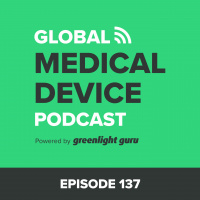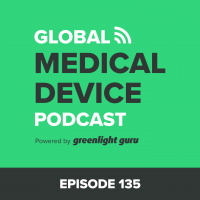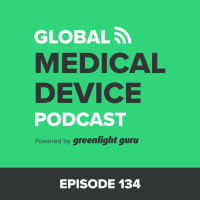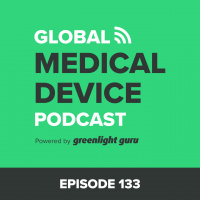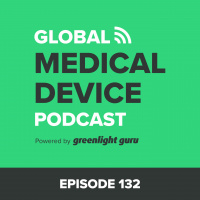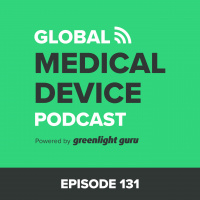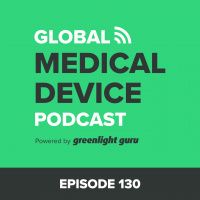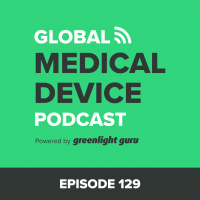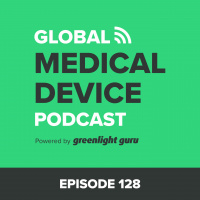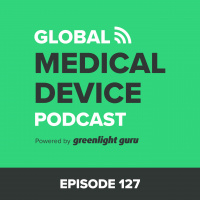Synopsis
The Global Medical Device Podcast powered by greenlight.guru is where today's brightest minds in the medical device industry go to get their most useful and actionable insider knowledge, direct from some of the world's leading medical device experts and companies.
Episodes
-
How to Use Artificial Intelligence & Machine Learning to Produce Better, Smarter, Safer Devices
13/05/2020 Duration: 45minWhat is artificial intelligence (AI) and machine learning (ML) and how do the two differ in the medical device industry? How can companies leverage AI and ML in their medical devices to improve the quality of life? In this episode of the Global Medical Device Podcast Jon Speer talks to Devon Campbell, founder of Prodct LLC, and Anthony Habayeb, co-founder and CEO of Monitaur.ai about how AI and ML can be utilized to produce better, safer, smarter, and faster medical devices. Some of the highlights of the show include: • What is AI? John McCarthy, Father of AI, defined it as: “The science and engineering of making intelligent machines.” Basically, it’s Independent robots thinking and acting like humans, completely autonomously. • ML is a technique within AI that focuses on algorithms and models in software to reach real-time conclusions and decisions based on a foundation of learning, training, and rules. • What’s the reality of AI adoption in major industries? It’s challenging to get large, regulated
-
510(k) Tips and Answers to Frequently Asked Questions for Medical Device Companies
06/05/2020 Duration: 43minWhat does the 510(k) process involve? How should medical device companies know if this is the right regulatory pathway to market? When should a premarket notification be submitted to FDA and how should it be prepared? What’s the Refuse To Accept (RTA) checklist? In this episode of the Global Medical Device Podcast, Mike Drues of Vascular Sciences joins host Jon Speer to tackle these and other common questions, and offer tips on the Premarket Notification 510(k) process to help companies achieve FDA clearance to sell their medical device in the United States marketplace. Some of the highlights of the show include: • What is a Premarket Notification 510(k)? Regulatory pathway to bring Class II medical devices (or Class I) using substantially equivalent predicate devices to market in the United States. • Different regulatory pathway options include: • 510(k) types: Traditional, Special, and Abbreviated/Performance • De Novo • Premarket Approval (PMA) • When to submit 510(k)? When development
-
Addressing the PPE Shortage with a No Cost Solution for Healthcare Providers
29/04/2020 Duration: 32minAre you a medical provider or caregiver unable to find facemasks as PPE for COVID-19? Get one for free. In this episode of the Global Medical Device Podcast, Jon Speer talks to Sanjay Vakil and Devon Campbell from MasksOn.org to discuss the impactful efforts being made through the MasksOn initiative that’s providing personal protective equipment and relief at no cost during the coronavirus pandemic. MasksOn.org is a non-profit effort to mass-produce reusable, sanitizable emergency masks and distribute it to those clinicians who do not have access to FDA-approved equipment. Listen now to learn more about the project and how you can get involved to help protect clinicians and save countless lives. Some of the highlights of the show include: • Medical Device Product Development: Devon and Sanjay share lessons learned about moving quickly or spending too much time on regulatory details. • User-forward Process: Put physicians and users first and foremost throughout design and development to create a solut
-
[LIVE] How EU MDR Changes are Impacting the Medical Device Ecosystem
22/04/2020 Duration: 30minNOTE: This episode was recorded prior to the EU Commission Proposal and now EU Parliament approval; pending EU Council (member states approval) and publication in the official journal (OJEU) for the official postponement of EU MDR. Once official, the DoA would be amended by one year, so when referring to the DoA as 26 May 2020 this would now be 26 May 2021. This live episode of the Global Medical Device Podcast was recorded at the Greenlight Guru True Quality Roadshow in Houston, with host Jon Speer his special guest Evangeline Loh, vice president of regulatory affairs at Emergo Group. Together they discuss key challenges medical device professionals are facing with EU MDR, how to best manage those challenges, and its impact on the medical device ecosystem. Some of the highlights of the show include: - EU MDR: The medical device regulation was scheduled to start on May 26, 2020, but will likely be postponed due to disruptions caused by the COVID-19 pandemic. - Second Corrigendum: Self-certified Class I
-
How to Approach Verification and Validation for Cloud Software
15/04/2020 Duration: 39minWhy is verification and validation (V&V) confusing and challenging for many medical device professionals? In today’s new episode of the Global Medical Device Podcast, Jon Speer and his guest Brad Graves, Principal Project Manager at The RND Group explore key aspects of the verification and validation topic and provide helpful clarification to medical device professionals about V&V cloud-based software. Some of the highlights of the show include: - Verification demonstrates that you designed the product correctly. Validation confirms you designed the correct product. - V&V are distinct, but interrelated activities. For example, a product can pass verification, but fail validation. Also, verification can be a product’s validation. - V&V Protocols, Approaches, and Tools: Involve product definition, requirements, risks, application and operating systems, and test cases. - Does all software require validation? Medical device software must be verified and validated, but software that supports
-
Fighting COVID-19: How one MedTech Company is Using UV-C Technology to Eliminate Virus & Save Lives
10/04/2020 Duration: 24minIn response to the COVID-19 pandemic, medical device companies are improving and saving lives through innovative technologies and methods to combat the virus. In this episode of the Global Medical Device Podcast, Jon Speer talks to Jeff Veenhuis and Quinn Leach from Surfacide, a company actively working in the fight against COVID-19 with their proven UV-C technology that destroys pathogens, including the novel coronavirus. Listen to their powerful story about how Surfacide has embraced the opportunity and is scaling operations in order to protect frontline healthcare workers around the world. Some of the highlights of the show include: - ABCs of UV: All three ultraviolet heat types come from the sun, only UV-C is blocked by the ozone layer because high doses can damage genetic material and break protein bonds. - Multidrug-resistant organisms, such as COVID-19, MRSA, and SARS, affect 5-15 percent of hospital patients and create inefficiency, additional cost, and immortality. - Coronavirus Data and Evide
-
Emergency Use Authorization (EUA) 101: What Medical Device Companies Need to Know
08/04/2020 Duration: 45minWhat qualifies and what does not for Emergency Use Authorization (EUA)? What is the impact of this rare regulatory pathway during the COVID-19 pandemic? In this episode of the Global Medical Device Podcast, Jon Speer talks to Mike Drues of Vascular Sciences in a highly relevant discussion on considerations for medical device professionals regarding EUA as a proper pathway to bring a medical device to market that can support the needs of healthcare providers and patients. Some of the highlights of the show include: - Why is it called Coronavirus? It has nothing to do with Corona beer. Rather, it comes from a family of viruses known for its crown or halo shape. - Similar to SARS Coronavirus that infected about 8,000 and killed about 800 people worldwide starting in 2002. Numbers for COVID-19 are much worse. - EUA has existed for many years and previously used primarily by drug and biotech companies for Anthrax, Ebola, H7N1, and other viruses/diseases. - EUA allows FDA to help strengthen the country’s pro
-
How to Integrate Usability into your Medical Device
01/04/2020 Duration: 30minMedical device usability is a critical, yet confusing component of medical device design, development, regulatory, marketability, and product success. Although three things are clear when it comes to your processes around usability for your medical device: do it early, do it right, and don’t try to cut corners. In this episode Isabella Schmitt, regulatory affairs consultant with Proxima Clinical Research, joins Jon Speer as his guest to discuss this topic, stressing the importance of usability and how you can integrate usability into your medical device. Some of the highlights of the show include: - Usability: Align and combine with other components to produce a successful medical device product and business. - Design Controls: Who are your users? What are their medical device needs? What appeals to them? What are they using now? - Risk Management: Start usability testing and human factors engineering early on and throughout the design process to mitigate errors and last-minute changes. - Perpetual Perf
-
[LIVE] Design Controls, Development & Risk for Software as a Medical Device (SaMD)
26/03/2020 Duration: 40minIn this modern digital world, did you know that most medical devices are not connected to the Internet? This episode of the Global Medical Device Podcast is a special live recording from The Greenlight Guru True Quality Roadshow in San Jose, California and is moderated by Tom Rish, Medical Device Guru at Greenlight Guru. Chris DuPont, CEO of Galen Data, joins Tom as his guest to discuss with live viewers and podcast listeners the design control and development process for software as a medical device (SaMD). Some of the highlights of the show include: - Galen Data’s Goal: Configurable, scalable, FDA-compliant software platform that easily and cost-effectively connects medical devices to an FDA-compliant Cloud. - Check Engine Equivalent: Galen Data’s facilitating staging platform for predictive analytics data and early integration into electronic medical record (EMR). - Input vs. Output: Design and risk controls for mechanical/hardware or software as a medical device are the same. - Design Control and Dev
-
How to Leverage IEC 62304 to Improve SaMD Development Processes
18/03/2020 Duration: 37minHow can the IEC 62304 standard serve as a framework for your Software as a Medical Device (SaMD) development processes? Today’s guest is Cathy Wilburn, Director of Quality Assurance and Compliance for The RND Group, a medical device software development company that helps clients write software, submission readiness, and compliance. Cathy joins Jon Speer to clarify the confusing parts of IEC 62304 and helps listeners understand how they can leverage this standard to improve development processes. Some of the highlights of the show include: - IEC 62304 is a software framework that offers necessary documentation and software engineering practices for 510(k) and PMA submissions to the FDA. - Recognized Consensus Standard: FDA evaluated and recommends using IEC 62304 to satisfy regulatory requirements and software development needs. - Requirement vs. Recommendation: IEC 62304 is voluntary, not prescriptive. However, most in the SaMD industry use and follow it to meet requirements. - IEC 62304 covers the fo
-
What is the eSTAR Pilot Program and How Will it Improve FDA's 510(k) Review Process?
12/03/2020 Duration: 38minThe FDA announced another new pilot program to improve the consistency and efficiency of its 510(k) review process. It’s called, eSTAR, or electronic Submission Template And Resource. Today’s guest is Mike Drues of Vascular Sciences. Together, we discuss the details of the eSTAR Pilot Program to help you understand what you need to know and do as medical device professionals. Some of the highlights of the show include: - New Format, Same Information: Content and regulatory burden remain unchanged, but the template is in PDF format and eliminates RTA Checklist. - Two-Fold, Two-Step Process: eSTAR aims to increase efficiency of 510(k) administrative and scientific reviews to decrease rejected 510(k) submissions. - FDA is seeking nine companies that represent a broad medical device industry to volunteer at least one 510(k) submission and provide feedback on eSTAR. - Additional Technical Requirements: Medical device must include software and come in contact with body tissue, but not necessarily the body or
-
How to Choose the Right FDA Regulatory Pathway for your Device
26/02/2020 Duration: 38minMost medical device professionals and companies are familiar with Premarket Approval (PMA) and 510(k) options. However, there are several other major regulatory pathways along with several sub-pathways (traditional, abbreviated, special, and safety and performance) that are available through the FDA. Today’s guest is Mike Drues of Vascular Sciences. Together, we introduce all of FDA’s regulatory pathways to bring a medical device to the U.S. market to help you understand which option is best for you. Some of the highlights of the show include: - Pathways to Market: Why are they important? Without knowing all the options, it’s difficult to choose the best regulatory pathway for a medical device. - Which pathways are appropriate for a medical device? Depends on classification and risk, which are contingent on labeling, intended use, and technology. - Medical Device Pyramid: Which devices are regulated by FDA, and how are they classified? Class I, II, and III. Class 0 wellness devices are not FDA regula
-
How to Establish a Solid Foundation for Fundraising and Product Success by Focusing on Regulatory
19/02/2020 Duration: 36minRegulatory is a big deal for medical device companies. Whether it’s a startup or established business, a strong understanding of regulations and regulatory strategy is vital for product success in the marketplace. Today’s guest is Isabella Schmitt, regulatory affairs consultant at Proxima Clinical Research where she specializes in quality and regulatory business advice. Isabella shares how medical device companies can establish a solid foundation for fundraising and product success through a heightened regulatory focus. Some of the highlights of the show include: - Lack of Focus: When a medical device company starts with technology rather than solving a problem, it makes accelerators, investors, and others nervous. - Minimum Viable Product (MVP): What are you targeting and when to stop developing product? Break the habit of perpetually perfecting something. - Don’t forget your mission. Obtain feedback and be receptive to it. Different opinions, along with expertise and knowledge, help you make a judgemen
-
4 Parts to Interviewing Candidates for Medical Device Roles
13/02/2020 Duration: 34minAre you looking to hire medical device professionals? Or, are you a professional seeking new job opportunities in the industry? Today’s guest is Mitch Robbins, founder and managing director of The Anthony Michael Group. He is a recruiter who specializes in quality and regulatory for the medical device industry. In this episode, Mitch breaks down the pros and cons of the four parts to the candidate interview process. Some of the highlights of the show include: - Candidate Prep and Priorities: Purpose is to help candidates decide whether to move forward in interview process by establishing value during initial interactions. - Do’s and Don’ts: Focus on previous outcomes, express interest in the company, and ask relevant questions, but avoid premature display of lack of interest. - Statistics: - 46% of all new hires fail within 18 months, and only 19% are successful. - 81% percent of people lie about themselves during job interviews. - Interview Process: - Part 1: Initial Assessment (core competenc
-
5 Tips for Hiring Medical Device Advisors
05/02/2020 Duration: 30minEverybody seeks advice and opinions from others from time to time, even those in the medical device industry. What are the pros and cons when it comes to hiring industry advisors? Today’s guest is Isabella Schmitt, regulatory affairs consultant at Proxima Clinical Research. Listen to this episode as Jon Speer and Isabella discuss good and bad practices when identifying and selecting advisors for your early stage or established medical device company. Some of the highlights of the show include: - Who are advisors? Consultants, board members, thought leaders, accelerators, and others that offer opinions on the course and direction of your company. - Who can you trust? Avoid advisors that are posturing, egotistical, always have to be right, and don’t listen to other opinions. A level of humility can gain your trust. - Startup vs. Established Company: Consider pass/fail criteria for advisors based on strategic approach, assessed risks, experience, cost, and connections. - Regulatory Affairs/Quality Assu
-
2 Key Areas Missing from FDA CDRH's Regulatory Science Priorities for 2020
29/01/2020 Duration: 37minWhat top priorities can medical device professionals and patients expect in 2020 from the Center for Devices and Radiological Health (CDRH)? Today’s guest is Mike Drues from Vascular Sciences. We discuss the recent FDA report that outlines CDRH’s regulatory science priorities, all of which are important, some more than others. However, there are a couple big ones missing. Listen to this episode for actionable tips on how you can develop your own list of priorities for 2020. Some of the highlights of the show include: - A comparison of historical context from the same reports in 2016 and 2017 to 2020, identifies 8 out of 10 of the same top priorities: - Big Data, biocompatibility, real-world evidence, clinical performance, clinical trial design, computational modeling, patient input, and digital health/cybersecurity. - What two priorities are missing in 2020 report? - Reprocessing reusable medical devices: Not all devices are properly reprocessed to prevent deaths and cross-contamination between pa
-
Navigating the Twists and Turns of Change Management for Medical Devices
28/12/2019 Duration: 49minChange is constant… Especially in the medical device industry. Medical device change management can be a challenging concept and process for companies, especially during FDA inspections and other audits from regulatory agencies. Today’s guest is Mike Drues of Vascular Sciences, who joins Jon Speer to discuss the twists and turns of what to expect, what you may experience, and what to focus on when dealing with change management. Some of the highlights of the show include: - Do’s and Don’ts of Change Management: Depends on device class and complexity, as to how stringent communication and reporting is required. - Change Management Options: Notify FDA or do not notify FDA of change. The information is the same, but what a company does with it is different. - Letter to File: Documentation describing change, why it’s being made, testing conducted to determine no impact on safety, efficacy, and performance to device. - With a change, avoid marking up documents before performing a preliminary engineering
-
What is FDA's ASCA Pilot Program and How Does it Impact Medical Device Manufacturers?
19/12/2019 Duration: 33minFDA announced the launch of a new program for test lab accreditation that will evaluate medical devices for conformity to specific consensus standards recognized by the regulatory agency. The Accreditation Scheme for Conformity Assessment (ASCA) Pilot Program allows third party testing laboratories to become eligible for accreditation to FDA-recognized consensus standards upon their evaluation of device safety and efficacy. Today’s guest is Mike Drues of Vascular Sciences, who joins Jon Speer to discuss the nuances of this pilot program, as well as provide insights and opportunities that can help device makers. Some of the highlights of the show include: - Medical device companies have three options: Select accredited/certified testing lab, select non-accredited/non-certified testing lab, or conduct their own testing. - There are definite advantages to selecting accredited/certified testing labs through the ASCA Pilot Program. - How does the ASCA Pilot Program compare to Digital Health Software Pre
-
5 Myths about QA/RA Recruiting in the Medical Device Industry
11/12/2019 Duration: 43minRecruiting top, elite quality assurance and regulatory affairs (QA/RA) talent in the medical device industry is challenging, but vitally important. Today’s guest is Mitch Robbins, managing director of The Anthony Michael Group. As a recruiter, Mitch joins Jon Speer on the show to break down five myths about QA/RA recruiting and discuss the dos and don’ts medical device companies should consider when hiring these professionals. Some of the highlights of the show include: - Myth #1: Recruiting isn’t necessarily the hiring manager’s responsibility, but also involves Human Resources (HR) or Talent Acquisition to own hiring decisions. - Myth #2: No time to invest in recruitment process to hire elite talent because so much time is spent micromanaging average performers. - Myth #3: Trust your gut feeling. It’s never wrong. You know an elite person when you see them. - Myth #4: Elite talent/top performers can’t be hired because our business can’t compete with perks and benefits offered by billion-dollar companie
-
How to Solve the Medtech Value Equation with Quality Data
05/12/2019 Duration: 32minWhich medical technology, product, or device are you focused on bringing to market that will positively impact and improve the quality of life? What are the obstacles and challenges you can expect to experience? How will you overcome those? Today’s guest is Devon Campbell, founder of Prodct, LLC, who joins Jon Speer to discuss the value equation for MedTech companies to elevate and escalate quality and improve value. Some of the highlights of the show include: - Data Process: Sooner than later, think through the deployment and infrastructure for a company’s quality management system (QMS) to generate quality data. - Quality Strategy Mindset: Learn to appreciate, understand, and demonstrate the value and purpose of quality data. - Due Diligence: Multiple reasons exist for MedTech companies getting their product or process into the hands of users sooner and serve as revenue source. - Deliver not just data, but extensive confidence in that data and in a way that end users and stakeholders value and trust,
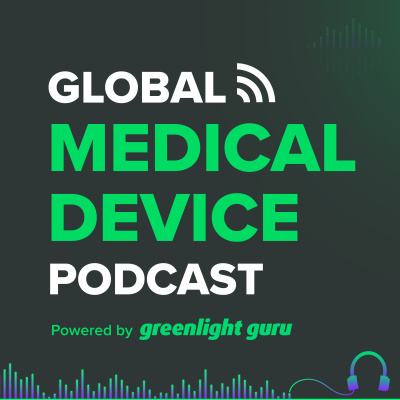
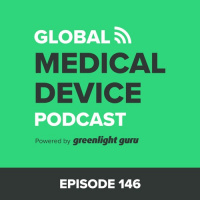
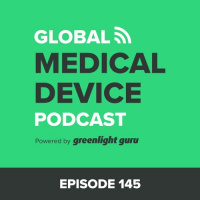
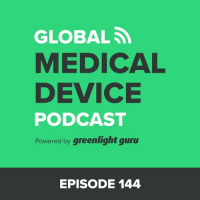
![[LIVE] How EU MDR Changes are Impacting the Medical Device Ecosystem](http://media3.ubook.com/catalog/book-cover-image/182649/200x200/115E33D5-E128-CDFB-419C-A59C1A847E04.jpg)
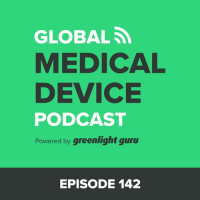
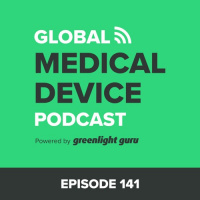
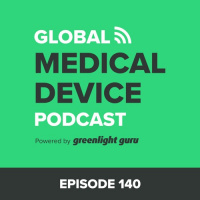
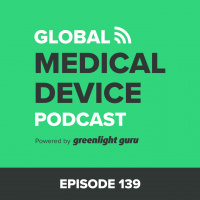
![[LIVE] Design Controls, Development Risk for Software as a Medical Device (SaMD)](http://media3.ubook.com/catalog/book-cover-image/182649/200x200/82F416DF-BA4D-CC91-00D3-C4C317A4EF2B.jpg)
